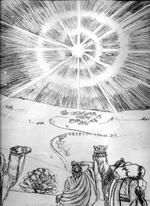 To what lengths are we willing to go in order to discover truth? Even more important: How willing are we to act on the truth we know? The Bible records, “After Jesus was born in Bethlehem in Judea, during the time of King Herod, Magi from the east came to Jerusalem and asked, “Where is the one who has been born king of the Jews? We saw his star in the east and have come to worship him”” (Matthew 2:1-2 NIV)
To what lengths are we willing to go in order to discover truth? Even more important: How willing are we to act on the truth we know? The Bible records, “After Jesus was born in Bethlehem in Judea, during the time of King Herod, Magi from the east came to Jerusalem and asked, “Where is the one who has been born king of the Jews? We saw his star in the east and have come to worship him”” (Matthew 2:1-2 NIV)
Who were these Magi? Traditionally, we refer to them as the “Wise Men.” However, their title refers to a special class or profession in the Persian Empire. They were influential and powerful men. They were wealthy. They were also astrologers. In their capacity of royal advisors, they studied the heavens to try to figure out the future and forewarn the Emperor. They charted the movements of the stars. They devised and kept the calendar. Some of them were mathematicians. In other words, they were the scientists of that day. They had at least as much influence and respect as scientists do today.
There is much we can learn from the example of the Magi who came to find the Christ.
a) They were willing to act on the truth as they knew it. The Bible is very clear that astrology is wrong. Yet that is what these men knew. Because they had a heart for truth, God used a sign in the heavens to bring them to Himself.
b) They were willing to inconvenience themselves to follow the truth. They had to make a long trip to find the child they sought. Ezra records that it took him some four and a half months to make a similar journey ( Ezra 7:8-9, 8:31). A trip of several months duration was not something to be taken lightly.
c) They were willing to endure the skepticism of their families and professional colleagues. There must have been plenty of other Magi who had seen the same star, but didn’t see the significance of it. “You’re going to take a sabbatical to follow a star? Come now, your interpretation might be wrong, you know!” Perhaps one of their wives or a brother said, “You’re going on a journey because you’ve seen a star? I’ve seen lot’s of stars too, but I’m not leaving home because of it!”
d) They were willing to risk being thought of as subversive agents of a foreign power. Though the Roman and Persian Empires were not at war at the time of Jesus’ birth, there was constant friction between the two. The two empires regarded each other as natural enemies. Herod certainly saw the Magi and their quest as a threat to his throne.
e) They were willing to chance looking like fools in front of the Temple scholars. “What? A foreigner is telling us that our Messiah is born? Just who do you think you are?” Or, even worse, “I’m sorry to tell you this, but you’ve really misunderstood all you’ve heard about the coming of the Messiah. Let me show you from our Scriptures how mistaken you are.”
f) They were willing to bow before a peasant. The Magi were wealthy. They were aristocrats. Yet, they were not upset or dismayed by the obvious poverty of the family of the King they had come to worship. They were able to look beyond the surface and accept Him as King even though He wasn’t in a palace.
g) They were willing to put their money where their mouth was. They gave costly gifts to Jesus.
h) They were willing to obey when given further instruction. They not only followed the star to the house in Bethlehem, but obeyed the command, given them in a dream, not to return to Herod.
i) They were willing to run the risk of being thought traitors to their own country. “What were you doing in our enemy’s territory?”
Since the Magi had a heart for truth; since they were willing to follow the truth no matter what the cost; since they were willing to worship and submit themselves to Jesus the King, we honor their memory two thousand years later. The real question is whether we are willing to seek and follow the Christ as they did.
